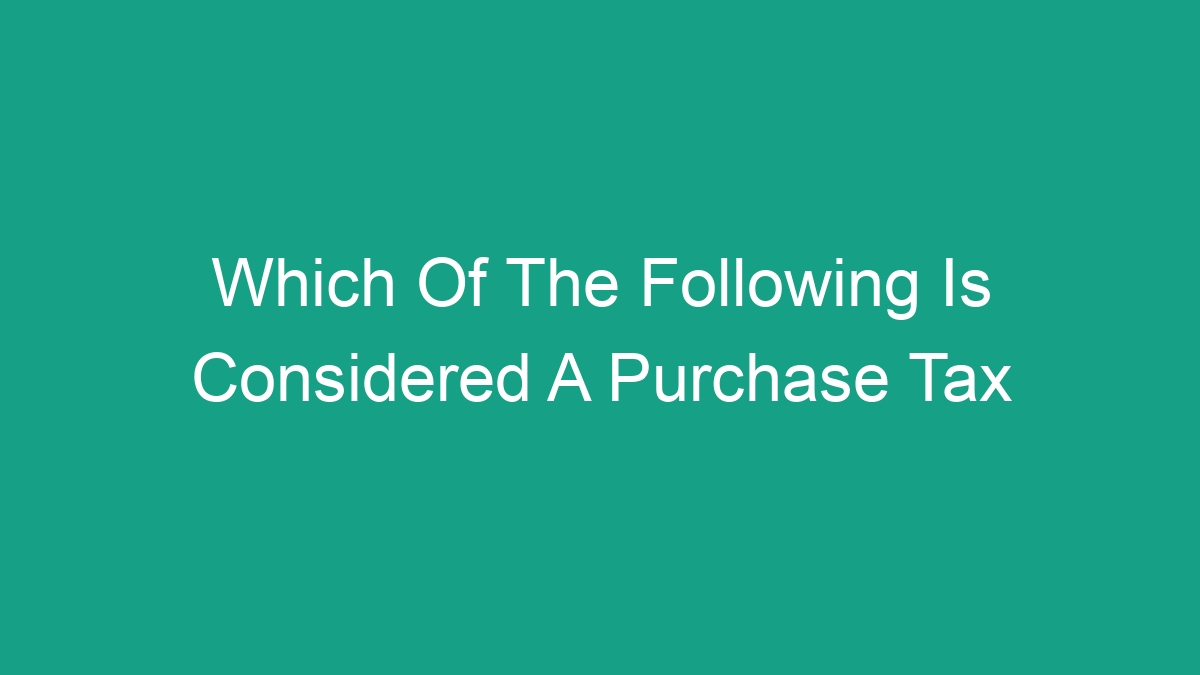
Purchase taxes are taxes that are levied on the purchase of goods or services. They are often included in the price of the item and are paid by the consumer at the point of sale. Purchase taxes can take many forms, including sales taxes, value-added taxes, excise taxes, and other fees.
Sales Taxes
Sales taxes are one of the most common types of purchase taxes. They are typically levied by state and local governments on the sale of goods and services. Sales taxes are usually a percentage of the purchase price and are added to the total at the time of sale. The seller is responsible for collecting the tax and remitting it to the appropriate tax authority.
Examples of goods and services that are subject to sales tax include:
- Clothing and footwear
- Electronics and appliances
- Restaurant meals and takeout
- Car rentals and hotel stays
Sales tax rates can vary widely by location, with some states and municipalities having higher rates than others. It’s important for consumers to be aware of the sales tax rates in their area so they can budget accordingly.
Value-Added Taxes
Value-added taxes (VAT) are another type of purchase tax that is commonly used in many countries around the world. Unlike sales taxes, which are only levied at the final point of sale, VAT is applied at each stage of production and distribution. This means that the tax is added to the value of the goods or services at each stage of the supply chain.
Key features of value-added taxes include:
- Collected by businesses at each stage of production
- Passed on to the next stage until the final consumer pays the full tax amount
- Allows for input tax credits to be claimed by businesses for taxes paid on inputs
VAT rates can vary by country and by the type of goods or services being taxed. In some cases, certain items may be exempt from VAT, while others may be subject to reduced rates or increased rates, depending on the economic and social policies of the country in question.
Excise Taxes
Excise taxes are targeted taxes that are applied to specific goods, such as alcohol, tobacco, and gasoline. These taxes are often used as a way to deter consumption of these products, as well as to raise revenue for the government. In the case of excise taxes on gasoline, for example, the tax is typically included in the price per gallon and is paid by the consumer at the pump.
Common products that are subject to excise taxes include:
- Alcoholic beverages
- Tobacco products
- Fuel and gasoline
- Luxury items such as jewelry and furs
Excise taxes can be levied at both the federal and state levels, and the rates can vary widely by location and by the type of product being taxed. For example, the federal excise tax on cigarettes is currently $1.01 per pack, while the excise tax on a gallon of gasoline is 18.4 cents.
Other Fees and Taxes
In addition to sales taxes, value-added taxes, and excise taxes, there are a variety of other fees and charges that can be considered purchase taxes. These can include things like import duties, environmental taxes, and special surcharges on specific items or industries.
Examples of other fees and taxes that can be considered purchase taxes include:
- Customs duties on imported goods
- Environmental taxes on items like plastic bags or carbon emissions
- Special surcharges on luxury items or high-value goods
- Local taxes on items such as hotel stays or rental cars
These additional fees and taxes can vary widely by location and can often be specific to certain industries or products. They are typically used as a way to raise revenue for the government, as well as to encourage certain behaviors or discourage others.
FAQ
1. What is the difference between a sales tax and a value-added tax?
A: Sales taxes are typically added to the final purchase price of a good or service, while value-added taxes are applied at each stage of production and distribution. This means that VAT is collected on the value added by each business in the supply chain, while sales tax is only collected on the final sale to the consumer.
2. Are all goods and services subject to purchase taxes?
A: Not all goods and services are subject to purchase taxes. Some items may be exempt from taxes, while others may be subject to reduced rates. It’s important to check the tax laws in your location to determine which items are subject to taxes and at what rate.
3. How do purchase taxes affect the economy?
A: Purchase taxes can have a significant impact on consumer behavior and economic growth. They can affect the prices of goods and services, as well as the overall cost of living. Additionally, they can be used as a way to raise revenue for the government and to influence certain behaviors, such as discouraging the consumption of alcohol or tobacco.
4. Do all countries have purchase taxes?
A: While many countries have some form of purchase tax, not all countries use the same types of taxes or apply them in the same way. The structure and rates of purchase taxes can vary widely around the world, depending on the economic and social policies of each country.
In conclusion, purchase taxes come in various forms and are applied to a wide range of goods and services. Whether it’s a traditional sales tax, a value-added tax, an excise tax, or other fees and charges, these taxes play a crucial role in generating revenue for the government and influencing consumer behavior.



